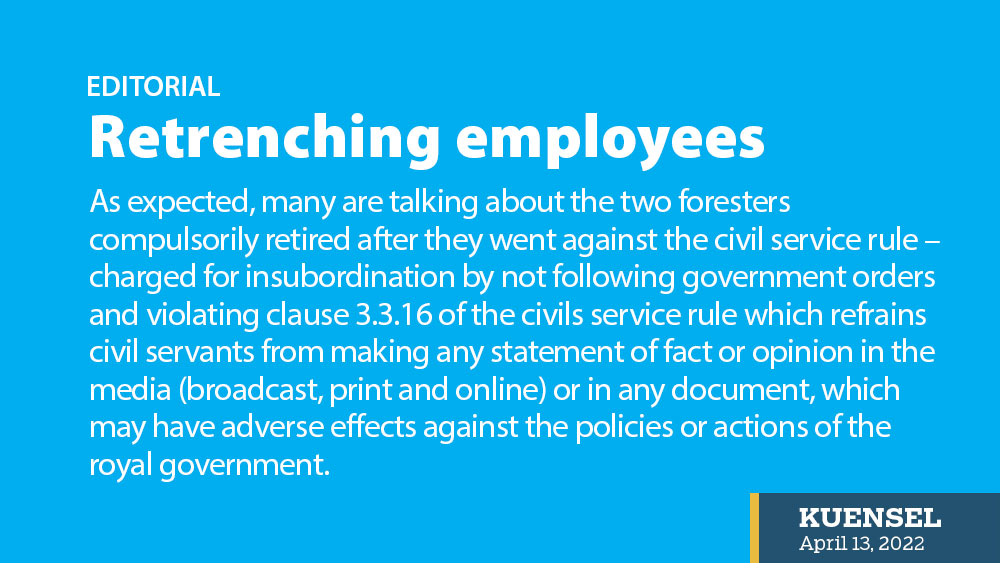As expected, many are talking about the two foresters compulsorily retired after they went against the civil service rule – charged for insubordination by not following government orders and violating clause 3.3.16 of the civils service rule which refrains civil servants from making any statement of fact or opinion in the media (broadcast, print and online) or in any document, which may have adverse effects against the policies or actions of the royal government.
The two foresters accused the department of unfair treatment, lack of transparency in transferring them and resorted to sharing their grievances through mainstream media. It backfired.
The recent incident, however, should not come as a surprise. What should be surprising is that after several reforms in the civil service, the largest employer, transferring or retrenching employees is still a dilemma that many of us are yet to come to terms with. On one hand, we are talking about such exercises – redeployment and retrenchment – long overdue considering that unproductive employees is problem in the society and a cost to the government coffer.
We know that the civil service, for that matter most of the public corporations, are over staffed and that hard decisions like retiring them is a big problem. Given our population, we have the highest per capita of civil servants per population. How much service is rendered is seen in the complaint of poor or slow service.
The Royal Civil Service Commission is in a reform mode. It was much-awaited. Reforms will make some happy while some deserving will benefit. The civil service should not be seen a kidu organisation where people can enjoy job security until superannuation. It is already saturated, restricting opportunities for those who can contribute or serve the people better. With technology, some would have already become redundant.
The civil service, it seems, is imbibing a corporate culture where performance and relevance matter. Not many will well come up initiatives like leadership assessments, organisational development exercises and redeployment. People are so used to the old system. And our culture is not helping. In a small society, retrenching people is difficult for many reasons. Management decisions could be misconstrued as personal grudges or favouritism because we are all friends or relatives, a friend’s friend or a relative’s relative.
Unlike in other countries where people move on to look for other jobs or opportunities, there is a social stigma attached to the loss of a job because it is also a loss of face. And as a civil servant, not many have planned or thought of anything but their job until superannuation.
In the private sector it is straight forward. If you are not performing or if the company is not making profits, they resort to cutting costs. The first is retrenching people or downsizing. With businesses affected by the Covid-19 pandemic, public corporations are doing the same. Some are slashing allowances and salaries while also reshaping to cut overhead costs if not able to enhance business or profit. With pressure from the government and shareholders, non performers or those benefiting more from an organization than what they contribute, will be eventually shown the door with or without benefits.
This is the reality. There will be unhappy ones who will appeal to authorities or go to the media . What is important is that decisions are logical and transparent. There will be grievances, but the civil service or public corporation are not kidu organisations and they should understand this.


